What do the recycling symbols on plastics mean? - Kechara
What do the recycling symbols on plastics mean? - Kechara
What do the recycling symbols on plastics mean? - Kechara
You also want an ePaper? Increase the reach of your titles
YUMPU automatically turns print PDFs into web optimized ePapers that Google loves.
<str<strong>on</strong>g>What</str<strong>on</strong>g> <str<strong>on</strong>g>do</str<strong>on</strong>g> <str<strong>on</strong>g>the</str<strong>on</strong>g> <str<strong>on</strong>g>recycling</str<strong>on</strong>g> <str<strong>on</strong>g>symbols</str<strong>on</strong>g> <strong>on</strong> <strong>plastics</strong> <strong>mean</strong>?<br />
(Source: http://ecomaidsofla.com/blog/2009/10/20/what-<str<strong>on</strong>g>do</str<strong>on</strong>g>-<str<strong>on</strong>g>recycling</str<strong>on</strong>g>-<str<strong>on</strong>g>symbols</str<strong>on</strong>g>-<strong>on</strong>-<strong>plastics</strong>-<strong>mean</strong>/)<br />
Here is your guide to figuring out what those <str<strong>on</strong>g>recycling</str<strong>on</strong>g> codes <strong>on</strong> <strong>plastics</strong> <strong>mean</strong>.<br />
Sometimes it seems like <str<strong>on</strong>g>the</str<strong>on</strong>g> modern world is <strong>on</strong>e colossal plastic palace. The versatile<br />
material is in our cars, toys, packaging, clothing, home goods, food utensils, medical<br />
devices and so much more.<br />
It is also littering our streets, clogging our waterways and choking marine life. Many<br />
<strong>plastics</strong> can be readily recycled, but how <str<strong>on</strong>g>do</str<strong>on</strong>g> c<strong>on</strong>sumers make sense of all <str<strong>on</strong>g>the</str<strong>on</strong>g> different<br />
types and rules?<br />
PLEASE NOTE that <str<strong>on</strong>g>the</str<strong>on</strong>g> <strong>Kechara</strong> Earth Project <str<strong>on</strong>g>recycling</str<strong>on</strong>g> activity <str<strong>on</strong>g>do</str<strong>on</strong>g>es not take Number 6<br />
and 7 <strong>plastics</strong>, and those without any <str<strong>on</strong>g>symbols</str<strong>on</strong>g>.<br />
Number 1<br />
PET or PETE (polyethylene terephthalate)<br />
PET plastic is <str<strong>on</strong>g>the</str<strong>on</strong>g> most comm<strong>on</strong>ly plastic for single-use bottled beverages because it is<br />
inexpensive, lightweight and easy to recycle. It poses low risk of leaching break<str<strong>on</strong>g>do</str<strong>on</strong>g>wn<br />
products. Recycling rates remain relatively low (around 20%), though <str<strong>on</strong>g>the</str<strong>on</strong>g> material is in<br />
high demand by re manufacturers.<br />
FOUND IN Soft drink, water and beer bottles; mouthwash bottles; peanut butter<br />
c<strong>on</strong>tainers; salad dressing and vegetable oil c<strong>on</strong>tainers; ovenable food trays.<br />
RECYCLING Picked up through most kerbside <str<strong>on</strong>g>recycling</str<strong>on</strong>g> programmes.<br />
RECYCLED INTO Polar fleece, fiber, tote bags, furniture, carpet, paneling, straps,<br />
(occasi<strong>on</strong>ally) new c<strong>on</strong>tainers
Number 2<br />
Plastics HDPE (high density polyethylene)<br />
HDPE is a versatile plastic with many uses, especially for packaging. It carries low risk of<br />
leaching and is readily recyclable into many goods.<br />
FOUND IN Milk jugs, juice bottles; bleach, detergent and household cleaner bottles;<br />
shampoo bottles; some trash and shopping bags; motor oil bottles; butter and yoghurt<br />
tubs; cereal box liners<br />
RECYCLING Picked up through most kerbside <str<strong>on</strong>g>recycling</str<strong>on</strong>g> programmes, although some<br />
allow <strong>on</strong>ly those c<strong>on</strong>tainers with necks<br />
RECYCLED INTO Laundry detergent bottles, oil bottles, pens, <str<strong>on</strong>g>recycling</str<strong>on</strong>g> c<strong>on</strong>tainers, floor<br />
tile, drainage pipe, lumber, benches, <str<strong>on</strong>g>do</str<strong>on</strong>g>ghouses, picnic tables, fencing
Number 3<br />
Plastics V (Vinyl) or PVC<br />
PVC is tough and wea<str<strong>on</strong>g>the</str<strong>on</strong>g>rs well so it is comm<strong>on</strong>ly used for piping, siding and similar<br />
applicati<strong>on</strong>s. PVC c<strong>on</strong>tains chlorine, so its manufacture can release highly dangerous<br />
dioxins. If you must cook with PVC, <str<strong>on</strong>g>do</str<strong>on</strong>g>n’t let <str<strong>on</strong>g>the</str<strong>on</strong>g> plastic touch food. Also never burn PVC,<br />
because it releases toxins.<br />
FOUND IN Win<str<strong>on</strong>g>do</str<strong>on</strong>g>w cleaner and detergent bottles, shampoo bottles, cooking oil bottles,<br />
clear food packaging, wire jacketing, medical equipment, siding, win<str<strong>on</strong>g>do</str<strong>on</strong>g>ws, piping<br />
RECYCLING Rarely recycled; accepted by some plastic lumber makers<br />
RECYCLED INTO Decks, paneling, mudflaps, roadway gutters, flooring, cables, speed<br />
bumps, mats
Number 4<br />
Plastics LDPE (low density polyethylene)<br />
LDPE is a flexible plastic with many applicati<strong>on</strong>s. Historically it has not been accepted<br />
through most kerbside <str<strong>on</strong>g>recycling</str<strong>on</strong>g> programmes, but more and more communities are<br />
starting to accept it.<br />
FOUND IN Squeezable bottles; bread, frozen food, dry cleaning and shopping bags; tote<br />
bags; clothing; furniture; carpet<br />
RECYCLING LDPE is not often recycled through kerbside programmes, but some<br />
communities will accept it. Plastic shopping bags can be returned to many stores for<br />
<str<strong>on</strong>g>recycling</str<strong>on</strong>g><br />
RECYCLING INTO Trash can liners and cans, compost bins, shipping envelopes,<br />
paneling, lumber, landscaping ties, floor tile
Number 5<br />
Plastics PP (polypropylene)<br />
Polypropylene has a high melting point, and so is often chosen for c<strong>on</strong>tainers that must<br />
accept hot liquid. It is gradually becoming more accepted by recyclers.<br />
FOUND IN Some yoghurt c<strong>on</strong>tainers, syrup bottles, ketchup bottles, caps, straws,<br />
medicine bottles<br />
RECYCLING Number 5 <strong>plastics</strong> can be recycled through some kerbside programmes<br />
RECYCLED INTO Signal lights, battery cables, brooms, brushes, auto battery cases, ice<br />
scrapers, landscape borders, bicycle racks, rakes, bins, pallets, trays
Number 6<br />
Plastics PS (polystyrene)<br />
Polystyrene can be made into rigid or foam products - in <str<strong>on</strong>g>the</str<strong>on</strong>g> latter case it is popularly<br />
known as <str<strong>on</strong>g>the</str<strong>on</strong>g> trademark Styrofoam. Evidence suggests polystyrene can leach potential<br />
toxins into foods. The material was l<strong>on</strong>g <strong>on</strong> envir<strong>on</strong>mentalists’ hit lists for dispersing widely<br />
across <str<strong>on</strong>g>the</str<strong>on</strong>g> landscape, and for being notoriously difficult to recycle. Most places still <str<strong>on</strong>g>do</str<strong>on</strong>g>n’t<br />
accept it, though it is gradually gaining tracti<strong>on</strong>.<br />
FOUND IN Disposable plates and cups, meat trays, egg cart<strong>on</strong>s, take-away c<strong>on</strong>tainers,<br />
aspirin bottles, compact disc cases<br />
RECYCLING Number 6 <strong>plastics</strong> can be recycled through some kerbside programmes<br />
RECYCLED INTO Insulati<strong>on</strong>, light switch plates, egg cart<strong>on</strong>s, vents, rulers, foam packing,<br />
take-away c<strong>on</strong>tainers
Number 7<br />
Plastics Miscellaneous<br />
A wide variety of plastic resins that <str<strong>on</strong>g>do</str<strong>on</strong>g>n’t fit into <str<strong>on</strong>g>the</str<strong>on</strong>g> previous categories are lumped into<br />
number 7. A few are even made from plants (polyactide) and are compostable.<br />
Polycarb<strong>on</strong>ate is number 7, and is <str<strong>on</strong>g>the</str<strong>on</strong>g> hard plastic that has parents worried <str<strong>on</strong>g>the</str<strong>on</strong>g>se days,<br />
after studies have shown it can leach potential horm<strong>on</strong>e disruptors.<br />
FOUND IN Three- and five-gall<strong>on</strong> water bottles, ‘bullet-proof’ materials, sunglasses, DVDs,<br />
iPod and computer cases, signs and displays, certain food c<strong>on</strong>tainers, nyl<strong>on</strong><br />
RECYCLING Number 7 <strong>plastics</strong> have traditi<strong>on</strong>ally not been recycled, though some<br />
kerbside programmes now take <str<strong>on</strong>g>the</str<strong>on</strong>g>m<br />
RECYCLED INTO Plastic lumber, custom-made products


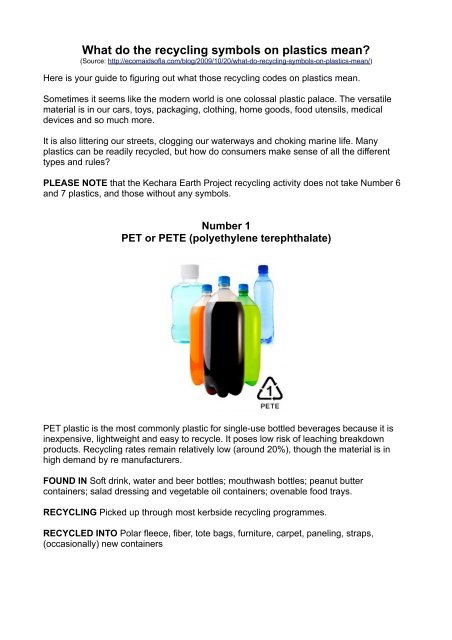
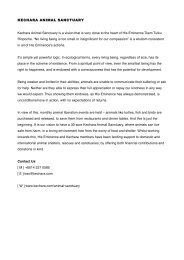
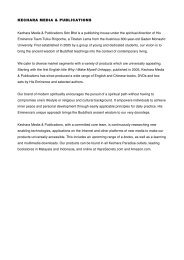


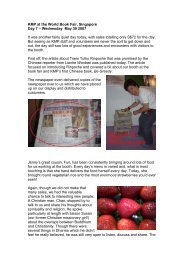
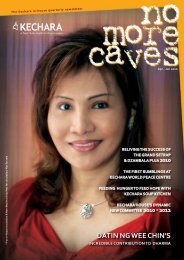
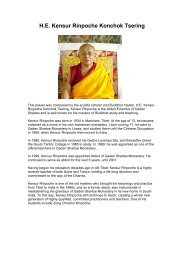
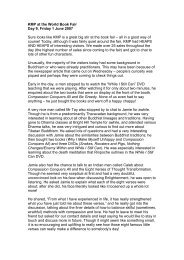
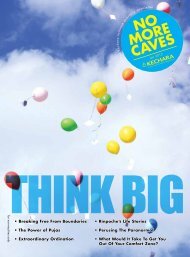
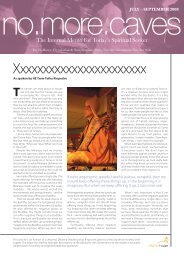


![7_NMC - OctDec09 [28Oct09] lowres.pdf - Kechara](https://img.yumpu.com/23793597/1/184x260/7-nmc-octdec09-28oct09-lowrespdf-kechara.jpg?quality=85)
